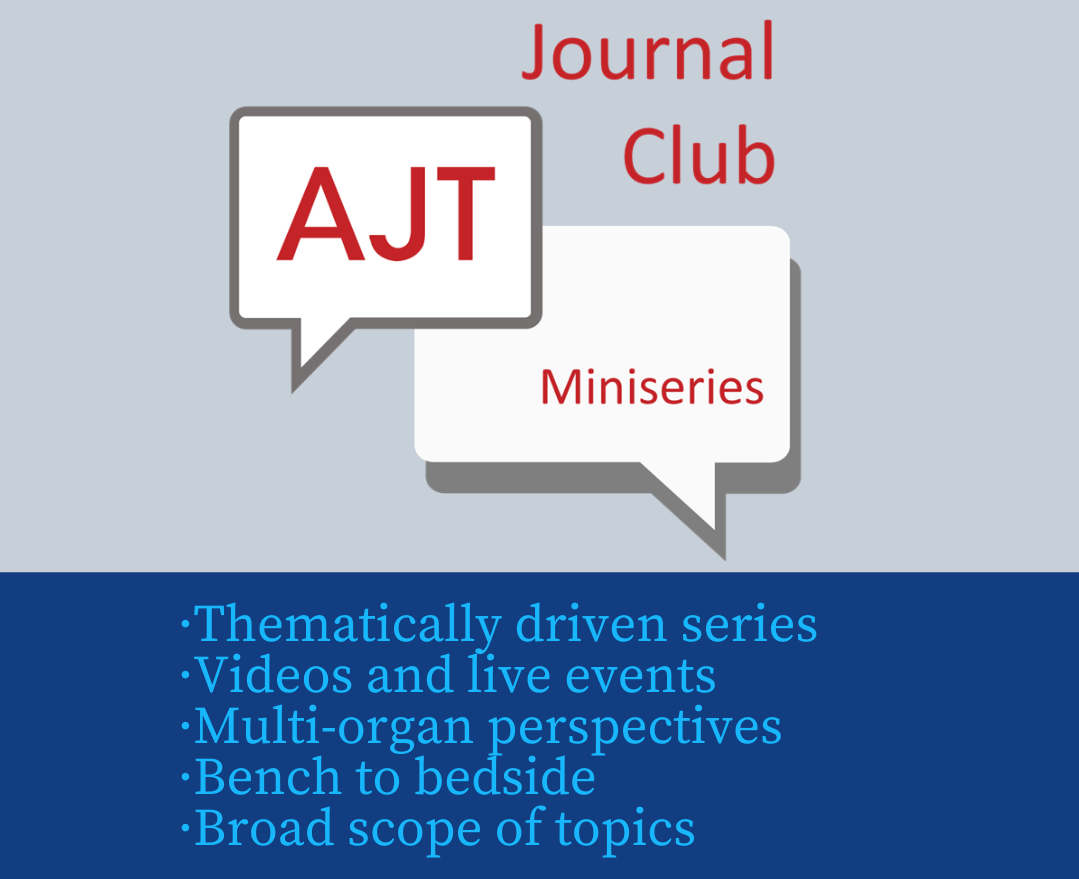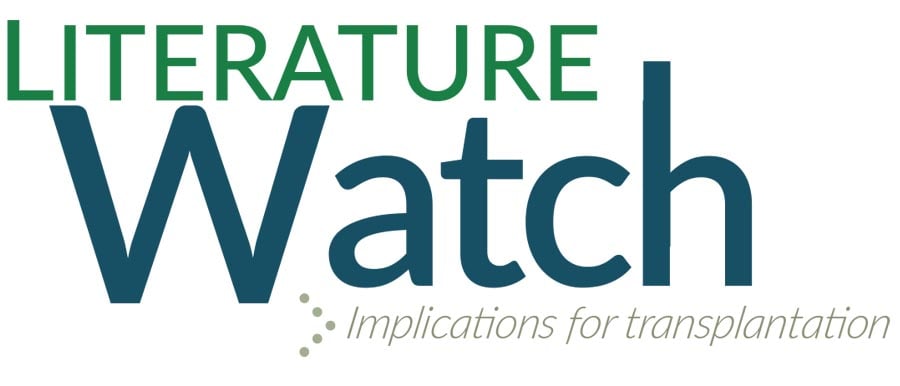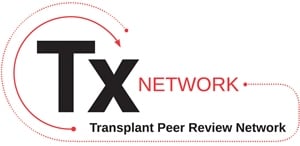Journal list menu
Export Citations
Download PDFs
Editorials
Growing Pains from The Islet Cell Transplant World
- Pages: 1-2
- First Published: 15 November 2006
Considering the limited long-term survival of islet transplants, the degree of renal damage observed in islet transplants is a concern. See also article by Senior et al in this issue on page 91.
Alloimmunity: No Toll Exemption
- Pages: 3-4
- First Published: 14 December 2006
Recent work by several groups defines the important role of the Toll-like receptors in alloimmunity.
Minireview
Gal Knockout and Beyond
- Pages: 5-11
- First Published: 14 December 2006
This brief review summarizes the current status of Gal knock-out pig organs transplanted into non-human primate recipients, and suggests what further hurdles need to be overcome to achieve long-term survival.
Special Feature
TRIBUTE: Dr. Robert Zhen Zhong Born in Shanghai, China, January 16, 1946 Died in London, Ontario, September 8, 2006
- Pages: 12-13
- First Published: 14 December 2006
Tribute to the late Dr. Robert Zhen Zhong by two of his former colleagues. Also in this issue please see several articles by this author, including a minireview on page 5, and two original articles on pages 17 and 27.
Personal Viewpoint
Missed Opportunities: The Institute of Medicine Report: Organ Donation: Opportunities for Action
- Pages: 14-16
- First Published: 15 November 2006
The author argues that “The Institute of Medicine Report, Organ Donation: Opportunities for Action” missed opportunities to try to increased the number of organ donors; the net effect is to maintain the status quo.
Original Articles
Basic Science
NOS2 (iNOS) Deficiency in Kidney Donor Accelerates Allograft Loss in a Murine Model
- Pages: 17-26
- First Published: 25 October 2006
Lack of NOS2 expression in kidney donors resulted in advancing graft rejection in a murine model of kidney allotransplantation, indicating a protective role of donor NOS2 activity in renal allograft survival.
Anti-CD45RB Monoclonal Antibody Prolongs Renal Allograft Survival in Cynomolgus Monkeys
- Pages: 27-37
- First Published: 14 December 2006
In monkeys receiving kidney allografts, antibody against human CD45RB prolonged graft survival either alone or in combination with tacrolimus.
Quantification of Basal and Stimulated ROS Levels as Predictors of Islet Potency and Function
- Pages: 38-47
- First Published: 14 December 2006
A luminol-based chemiluminescence assay to quantify ROS from intact rat and human islets predicted islet potency in transplants into streptozotocin-induced diabetic immunodeficient (NOD-SCID) mice, as well as results in clinical islet transplantation.
Sirolimus Improves Early Microcirculation, but Impairs Regeneration After Pancreatic Ischemia-Reperfusion Injury
- Pages: 48-56
- First Published: 07 November 2006
In a rodent model of warm pancreatic ischemia, administration of sirolimus improved microcirculation at a very early stage, but resulted in an impairment of the recovery phase after ischemia-reperfusion injury.
Chronic Cardiac Transplant Arteriopathy in Mice: Relationship of Alloantibody, C4d Deposition and Neointimal Fibrosis
- Pages: 57-65
- First Published: 07 November 2006
Passive transfer of complement fixing anti-MHC class I antibodies caused allograft arteriopathy that persisted in murine heart allografts after C4d deposition in the capillaries had disappeared, arguing for the importance of serial sampling to ascertain the relevance of alloantibody to chronic graft rejection.
Prolonged Function of Macrophage, von Willebrand Factor-Deficient Porcine Pulmonary Xenografts
- Pages: 66-75
- First Published: 15 November 2006
vWF plays a role in the ‘delayed’ dysfunction observed in pulmonary xenotransplantation using PIM depleted hMCP organs.
Macrolides Inhibit IL17-induced IL8 and 8-isoprostane Release from Human Airway Smooth Muscle Cells
- Pages: 76-82
- First Published: 25 October 2006
Unlike immunosuppressives and steroids, erythromycin and azithromycin decrease IL-8 production, which could contribute to their anti-inflammatory effects and their application to BOS in lung transplantation.
Early Hemodynamic Injury During Donor Brain Death Determines the Severity of Primary Graft Dysfunction after Lung Transplantation
- Pages: 83-90
- First Published: 07 November 2006
In rats, lungs retrieved late from brain-dead donors had similar inflammatory markers to those retrieved early, but significantly lower pulmonary vascular resistance.
Clinical Science
Changes in Renal Function after Clinical Islet Transplantation: Four-Year Observational Study
- Pages: 91-98
- First Published: 14 December 2006
Clinical islet transplantation is associated with a deterioration in renal function despite improved glycemia, although individual responses are varied and difficult to predict. See also editorial by Cosio and Burke in this issue on page.
Cold Ischemia Time and Allograft Outcomes in Live Donor Renal Transplantation: Is Live Donor Organ Transport Feasible?
- Pages: 99-107
- First Published: 07 November 2006
This analysis of national UNOS/OPTN data found that cold ischemic time durations of up to 8 hours were not associated with compromised long-term renal allograft outcomes, suggesting that regional transport of live donor organs may be a feasible option for kidney paired donation.
Prevalence and Risk Factors of Non-Adherence with Immunosuppressive Medication in Kidney Transplant Patients
- Pages: 108-116
- First Published: 15 November 2006
The extent to which kidney transplant patients are adherent to the immunosuppressive therapy, which is an important prerequisite for long-term transplant survival, varies substantially between patients, and partially depends on patient-related characteristics.
Immunoadsorption in Severe C4d-Positive Acute Kidney Allograft Rejection: A Randomized Controlled Trial
- Pages: 117-121
- First Published: 15 November 2006
This randomized controlled trial, which was prematurely terminated because of a high graft loss rate in a control group subjected to tacrolimus conversion and (if indicated) anti-cellular treatment only, suggests efficiency of immunoadsorption with protein A in reversing severe C4d-positive antibody-mediated rejection.
Short- and Long-Term Outcomes with the Use of Kidneys and Livers Donated after Cardiac Death
- Pages: 122-129
- First Published: 25 October 2006
In the UNOS data, outcomes for kidneys and livers from donors deceased after cardiac death are encouraging when compared to the alternatives.
Successful Combined Partial Auxiliary Liver and Kidney Transplantation in Highly Sensitized Cross-Match Positive Recipients
- Pages: 130-136
- First Published: 07 November 2006
This pilot study demonstrates that an auxiliary partial liver graft, transplanted with the sole purpose of reducing the effect of anti-donor lymphocytotoxic HLA-antibodies, enables concomitant kidney transplantation against a positive lymphocytotoxic crossmatch in sensitized recipients.
Randomized Controlled Trial of Tacrolimus Versus Microemulsified Cyclosporin (TMC) in Liver Transplantation: Poststudy Surveillance to 3 Years
- Pages: 137-141
- First Published: 15 November 2006
This 3 year study re-affirms the superiority of tacrolimus based immunosuppression in adults undergoing primary liver transplantation using the combined endpoints based on freedom from death, graft failure, and treatment failure.
Selective Use of Older Adults in Right Lobe Living Donor Liver Transplantation
- Pages: 142-150
- First Published: 07 November 2006
Early experience with the use of older adults (>44 years) as donors in right lobe living donor liver transplantation from a single North American center is encouraging, but this option may be associated with higher rates of biliary complications in the recipients.
Nontransplantation of Livers from Deceased Donors Who Are Able to Donate Another Solid Organ: How Often and Why It Happens
- Pages: 151-160
- First Published: 07 November 2006
Despite the increasing use of expanded criteria livers, older age and NAFL still account for a significant proportion of livers that go untransplanted.
Biliary Strictures in 130 Consecutive Right Lobe Living Donor Liver Transplant Recipients: Results of a Western Center
- Pages: 161-167
- First Published: 07 November 2006
The pattern and management of biliary strictures after right-lobe living donor liver transplantation (RLDLT) from this experience from a single Western center shows that, although biliary strictures are common in RLDLT, they can usually be managed non-operatively and do not affect short-term graft survival.
Acute Renal Disease, as Defined by the RIFLE Criteria, Post-Liver Transplantation
- Pages: 168-176
- First Published: 15 November 2006
ARF, but not ARI, as defined by the RIFLE criteria, had an impact on 30-day and 1-year patient survival and longer length of hospital stay in liver transplant recipients.
Rejection Under Alpha Interferon Therapy in Liver Transplant Recipients
- Pages: 177-184
- First Published: 07 November 2006
Under alpha interferon therapy 21% of liver transplants manifested acute rejection, particularly those with previous rejection.
Efficacy and Safety of Antifibrinolytic Drugs in Liver Transplantation: A Systematic Review and Meta-Analysis
- Pages: 185-194
- First Published: 07 November 2006
Aprotinin and tranexamic acid significantly reduce transfusion requirements during liver transplantation, with no apparent increased risk of thrombo-embolic complications.
Active Immunization to Prevent De Novo Hepatitis B Virus Infection in Pediatric Live Donor Liver Recipients
- Pages: 195-200
- First Published: 14 December 2006
Active immunization is an effective method to prevent de novo HBV infection in pediatric patients with efficient primary vaccination undergoing living donor liver transplantation.
Quilty Effect Has the Features of Lymphoid Neogenesis and Shares CXCL13–CXCR5 Pathway With Recurrent Acute Cardiac Rejections
- Pages: 201-210
- First Published: 25 October 2006
QE displays the cellular, molecular and vascular features of lymphoid organs and shares a common molecular and cellular pathway, consisting of CXCL13/BCA-1/BLC expression and CD20+B lymphocyte recruitment, with recurrent episodes of acute cardiac rejection.
Traumatic Memories of Relatives Regarding Brain Death, Request for Organ Donation and Interactions with Professionals in the ICU
- Pages: 211-217
- First Published: 07 November 2006
Organ-focused behavior of professionals and an ambivalent decision-making style of relatives are risk factors for traumatic memories.
Clinical Trial of the Pan-Caspase Inhibitor, IDN-6556, in Human Liver Preservation Injury
- Pages: 218-225
- First Published: 07 November 2006
The first human trial of a caspase inhibitor in organ preservation suggests the agent offers local therapeutic protection against liver CI/WR-mediated apoptosis and injury.
Prevalence and Estimated Incidence of Blood-Borne Viral Pathogen Infection in Organ and Tissue Donors from Northern Alberta
- Pages: 226-234
- First Published: 15 November 2006
Tissue donors from Northern Alberta, in particular living surgical bone donors who are followed up with repeat HBV, HCV, and HIV screening at least 6 months after their donation, are at very low risk for infection with and thus transmitting these blood-borne viral pathogens.
Brief Communications
Progressive Wild-Type Transthyretin Deposition after Liver Transplantation Preferentially Occurs onto Myocardium in FAP Patients
- Pages: 235-242
- First Published: 25 October 2006
Liver transplantation in patients with familial amyloid polyneuropathy can result in paradoxical deposition of wild type TTR protein in the heart, leading to fatal cardiac dysfunction.
Renal Allograft Protection with Angiotensin II Type 1 Receptor Antagonists
- Pages: 243-248
- First Published: 07 November 2006
In 16 renal transplant recipients in this randomized trial, losartin decreased urinary proteins associated with renal damage compared with a beta blocker.
Following Anti-CD25 Treatment, A Functional CD4+CD25+ Regulatory T-Cell Pool Is Present in Renal Transplant Recipients
- Pages: 249-255
- First Published: 15 November 2006
Following anti-CD25 treatment, a CD4+ CD25+ regulatory T cell pool that is normal in size and function is present in the peripheral blood of renal transplant reccipients.
Case Report
Recurrent Nephrotic Syndrome in Homozygous Truncating NPHS2 Mutation Is Not Due to Anti-Podocin Antibodies
- Pages: 256-260
- First Published: 15 November 2006
In this child with steroid resistent nephrotic syndrome due to mutation in podocin, with late recurrence of proteinuria, no antibodies to podocin were detected.
Book Review
Last Best Gifts: Altruism and the Market for Human Blood and Organs - by Kieran Healy
- Pages: 261-262
- First Published: 14 December 2006
Letters to the Editor
Utility Versus Utilization of DCD Liver Allografts
- Page: 263
- First Published: 14 December 2006
Transplantation of En Bloc Kidneys from Very Small Pediatric Donors
- Page: 264
- First Published: 14 December 2006
Recovery and Utilization of Deceased Donor Kidneys from Small Pediatric Donors
- Page: 265
- First Published: 15 November 2006










.jpg)
